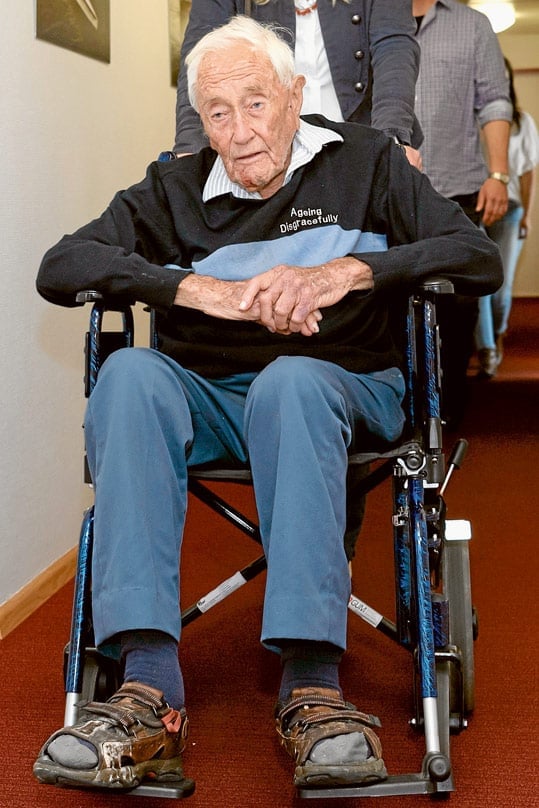
Although the 104 year-old veteran botanist, Professor David Goodall, was a willing star in his own celebrity assisted suicide in Switzerland, the flurry of headlines, smiley pre-suicide photo snaps and the apparent “scientific rationality” of his decision should cause us disquiet.
On 10 May David Goodall, with a small entourage accepted the ministrations of the Eternal Circle Foundation near Basel (one of several B&B styled assisted suicide businesses in the land of the cuckoo clock).
While a hovering doctor inserted the cannula and lines, Goodall himself turned the dial on a lethal dose of pentobarbital sodium (normally used in anaesthesia).
Although medically assisted suicide is now legal in several other legislatures around the world, including Luxembourg, Belgium and the US states of Oregon and Vermont, the Australian state of Victoria (as of next year) the Swiss law is more “hospitable.”
Switzerland’s 1942 law does not require would- be suicides to be ill or dying and allows foreign nationals to end their lives with the assistance of “end-of-life” entrepreneurs who are clustered in various locations in the country.
David Goodall’s public death, was favourably covered by media outlets around the world, like so many other suicides, it casts larger ripples beyond his apparently isolated “choice.” His dying is underlined by a whole matrix of tragedies both small and large. Professor Goodall was a long-time member of the organisation known today as Exit International which was founded in 1997 by former Australian doctor, campaigner and euthanasist Philip Nitschke.
It is a stretch to parody this man.
Nitschke, who can be seen grinning alongside Goodall in his final photos, now lives in the Netherlands from whence he acts as a globe-trotting euthanasia advocate and suicide-travel agent.
Nitschke’s is a macabre genius. He has a boyish enthusiasm for inventing devices which are lethal but undetectable post-mortem.
He began simply with a sealable plastic bag: “the exit bag” and then developed homebrewing equipment that can be converted so that there is no morning after the night before. He is now planning to market software that enables large 3-D printers to produce a plastic “Sarco”(short for sarcophagus)- which doubles as a “gentle” suffocator and coffin.
Although Goodall was clearly ageing, the debilitation of his eye-sight, hearing and mobility, appear to have occurred very late in his long life. He was not afflicted with the symptoms of terminal illness nor did he seem to be in great physical pain.
Among many issues, there are three troubling experiences which probably knocked this tough old scientist more severely than these.
In 2016 Professor Goodall’s working life at Edith Cowan University was brought to a sudden halt due to “health and safety” regulations. While well-meant, this single gesture forced the intensely focussed scientist out of his circle of colleagues and conversation. Even the deeply materialistic folks at Exit admitted “he just didn’t have the same spirit…. It was the beginning of not being happy anymore.”
It is ironic that a university’s fear of dangerous working conditions may have sprinkled the seeds of dangerous thoughts in their once honoured veteran scholar.
In April this year, Goodall fell, and because he lived alone, this left him unattended and no doubt traumatised for two days. His doctors, it is reported, strongly urged a nursing home for him. It was shortly after this that he decided to travel to his suicide.
We have a sense of the puncturing of the atheist Goodall’s spirit (in a soul he would no doubt deny) in his poignant statements to the press that his life no longer “had purpose” and that he wanted “no funeral, no memorial” and regretted his life.
Many if not most people fall into the bleak internal “black hole” during times of great loss. However, creative encouragement and love can enable those grieving to embrace some sort of horizon beyond this. This is surely the measure of a humane and mature community?
Perhaps it is no surprise that Goodall should latch onto a way to give himself a bigger “cause.” And Nitschke is never short of missionary zeal. Nitschke and his Exit colleagues project managed the funds, “the media event” travel plans (and trimmings) which meant that the rudderless Goodall had company, attention and the “good vibes” he felt were draining away from his living.
What short change for an eminent academic!
Surely this famous ecologist could be assisted in imaginative ways to contribute actively in what Pope Benedict XVI has called a fully “human ecology?”
It takes a whole society, time and attention to contribute to an affirming non-patronising ecology for the ageing and disabled, however august or humble. This ecology would support a flexible and adjustable network of work, life and meaning which actively accepts but does not perpetrate death.
See an excellent short summary of some of the problems with assisted suicide here: www.noeuthanasia.org.au/6_facts_about_assisted_suicide
